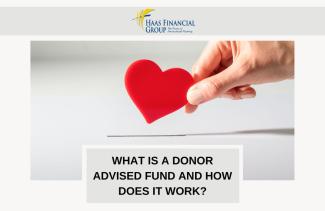
What Is A Donor Advised Fund and How Does It Work?
With Giving Tuesday right around the corner, we thought it would be a good time to talk about donor advised funds and how they could fit into a charitably inclined individual’s financial picture.
What is a donor advised fund (DAF)?
A DAF is an account that you can deposit assets to donate to public charities over time.
How is this different than me giving directly to the charities I want?
As opposed to gifting directly to a charity, a DAF allows you to make a gift, receive a charitable deduction, accumulate assets to then disburse to charities at a later time. Hence, there may be more benefits to using a DAF when you are consistently giving to public charities.
What are the benefits of a donor advised fund?
- You’ll get to claim a tax deduction in the year you contributed assets to a DAF as long as it’s above the standard deduction amount
- With the standard deductions at $25,900 for married couples and $12,950 for individuals (for 2022), many charitable gifts don’t provide you with an additional deduction. Gifting a larger lump sum to a DAF in a given year may allow you to itemize that deduction in a given year, to then disburse gifts over time.
- For example, if you typically give $10k/year to charity directly from your pocket, you may fall under the standard deduction. If you chose to fund a DAF of 5 years’ worth of contributions ($50k) in one year, you would be able to deduct $50k in that given year through itemized deductions. You could then gift your $10k/year as planned, from the DAF.
- With the standard deductions at $25,900 for married couples and $12,950 for individuals (for 2022), many charitable gifts don’t provide you with an additional deduction. Gifting a larger lump sum to a DAF in a given year may allow you to itemize that deduction in a given year, to then disburse gifts over time.
- Couple it with Roth conversions
- Some people like to offset the taxes that they will incur when executing a Roth conversion by making contributions to a DAF. This can ensure you will stay within a tax bracket you’re comfortable with
- Donate low cost-bases stock to get out of your estate
- If you have a stock that has a low-cost basis (for example, bought at $6/share and now valued at $70/share), donating stock to a DAF will remove it from your estate and avoid the capital gains you would have incurred if you sold it. The best part is, charities don’t have to pay capital gains tax on any highly appreciated stock!
What are the disadvantages of a donor advised fund?
Once you contribute to the fund, it is irrevocable and you will not be able to pull the money out for your own use. Another potential downfall with a DAF is that you’re limited to only donating to IRS-qualified public charities.
What can I contribute to a DAF?
You can contribute cash or securities, or other assets such as real estate.
What happens to my donor-advised fund after I pass away?
As long as you name successors on the account, it will continue making donations to the charities that you want to gift to! Your successors can also name their own successors, it can continue in perpetuity or until there are no more named successors on the fund.
Tracking # T004760
Investment Advice offered through Great Valley Advisor Group, a Registered Investment Advisor. Great Valley Advisor Group and Haas Financial Group are separate entities. This is not intended to be used as tax or legal advice. Please consult a tax or legal professional for specific information and advice.
Resources:
https://www.nptrust.org/donor-advised-funds/faq/
https://www.fidelitycharitable.org/guidance/philanthropy/what-is-a-donor-advised-fund.html
https://www.nerdwallet.com/article/taxes/donor-advised-funds

